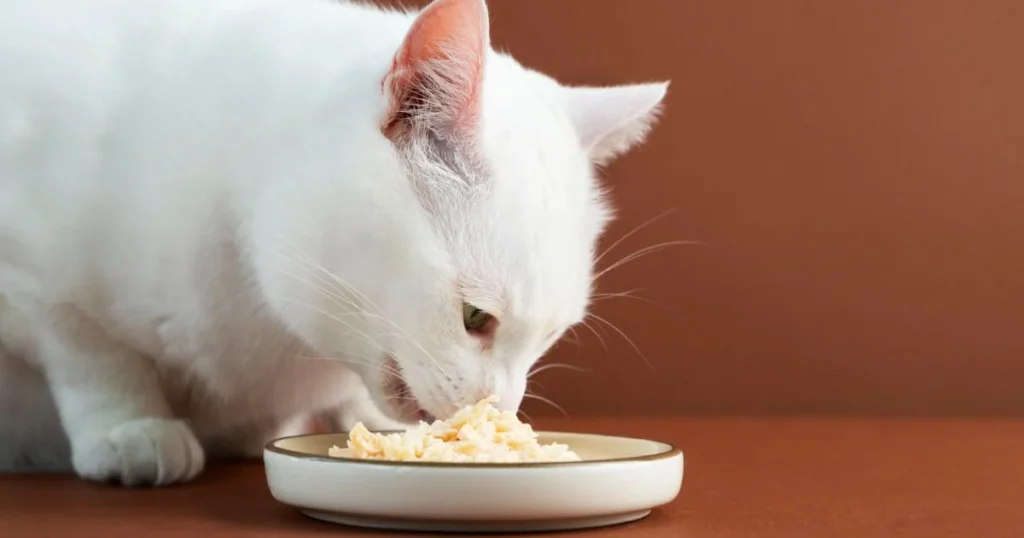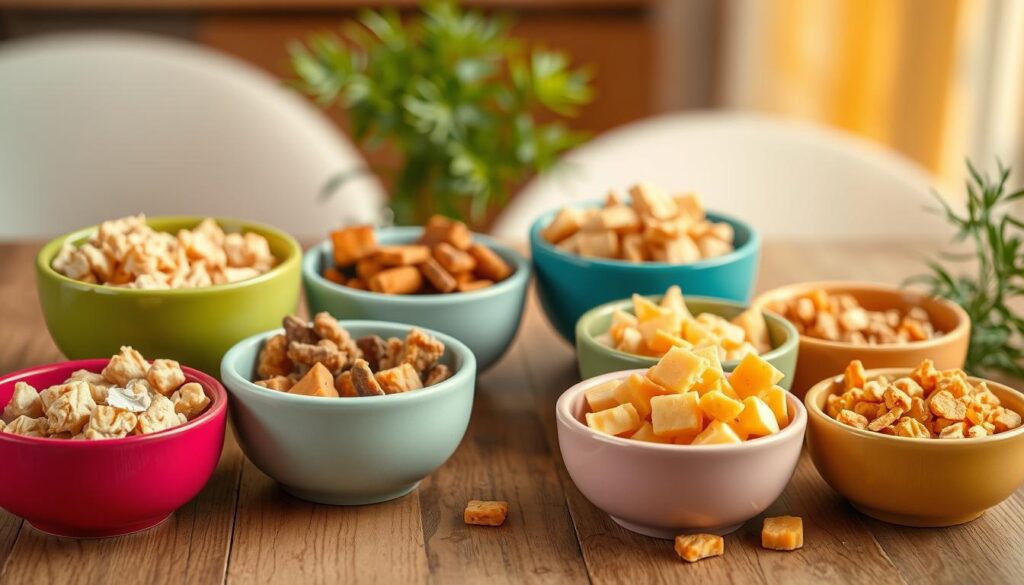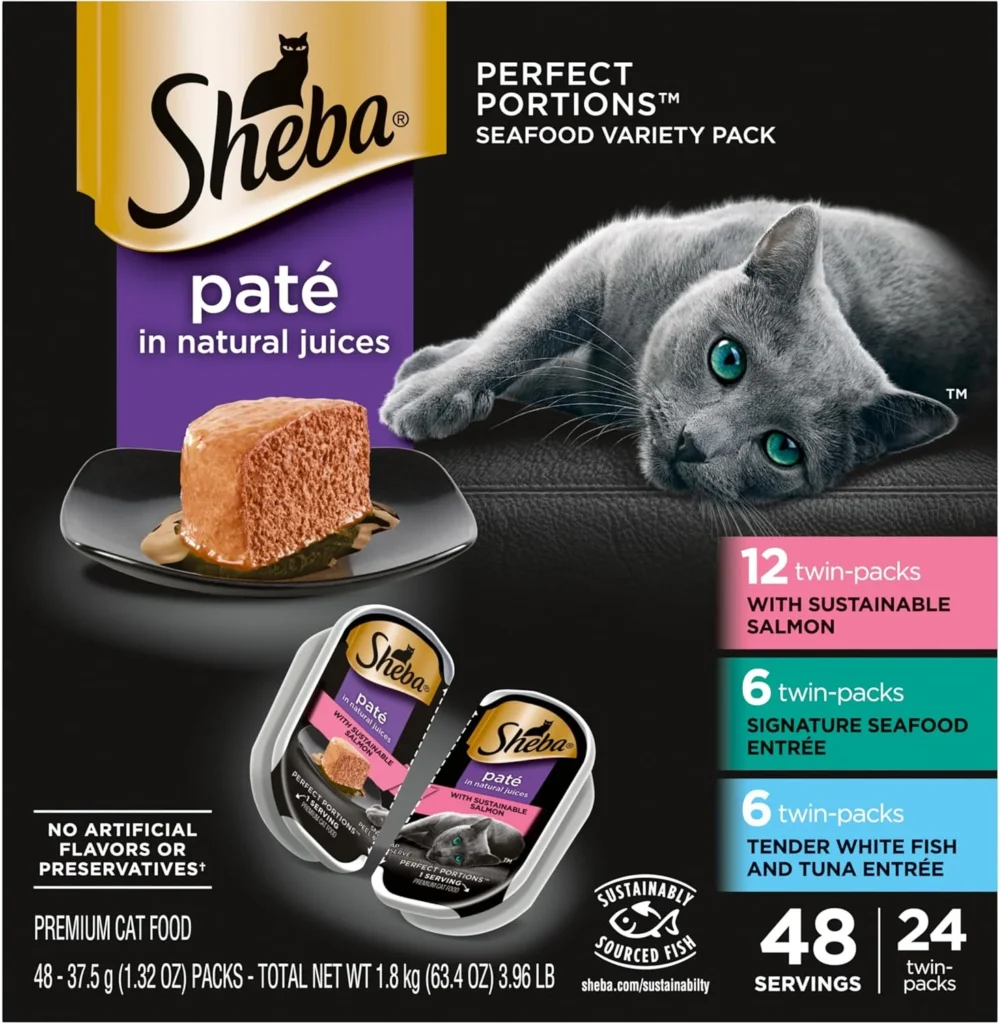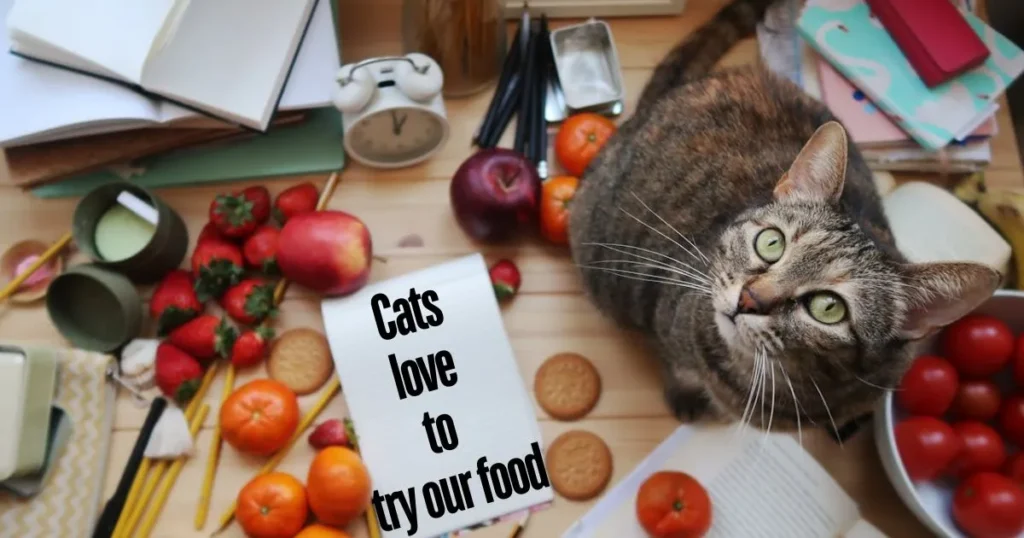As a devoted cat parent, you might want to share your favorite snacks with your furry friend. Cats are part of the family, and their happiness is important. But, it’s key to know that cats need special food, not all human food is safe for them.
Cats love to try our food, but their bodies need cat food to stay healthy. They are meat-eaters and need nutrients from animal products. The wrong human food can upset their stomachs or cause bigger health problems.
In this guide, we’ll look at safe human foods for cat treats and what to avoid. Knowing what’s safe helps keep your cat healthy and happy. This way, your cat gets a balanced diet and stays happy and healthy.
Understanding Cats as Obligate Carnivores
Cats are obligate carnivores, needing nutrients found only in animal proteins. They can’t digest plant-based foods well, like fruits and veggies, unless they’re cooked and pureed. This is why a balanced cat food is key to their health, providing all the vitamins and minerals they need.
Cats’ Nutritional Requirements
Kittens need more protein than adult cats, making them unique. They can’t make taurine from plants, so it’s vital in their diet. Without enough taurine, cats can get sick with heart and eye problems.
Cats also need arginine to keep their bodies safe from ammonia. They must get vitamin A from meat, as they can’t turn beta-carotene into it.
The Importance of a Balanced Diet
For a cat’s health, a balanced diet is essential. Cats can’t be vegan because they need meat for nutrients. Without meat, they might lack vitamin A, arachidonic acid, and taurine.
Commercial cat foods are a good start, but sometimes they need extra supplements. Cats should eat foods with at least 40% protein and less than 10% carbs. But, dry foods can be too rich in fat and calories, leading to obesity and diabetes.
Healthy Meat-Based Treats
Cats are meat lovers and need a diet full of animal proteins. Treats like cooked chicken for cats, cooked turkey for cats, cooked beef for cats, and cooked fish for cats are great. They give cats the amino acids, vitamins, and minerals they need for a healthy life.
Cooked, Unseasoned Chicken or Turkey
Cats eat food that’s not good for humans, but cooked chicken for cats and cooked turkey for cats are safe. Chicken comes from young chicks, and turkey is low in calories but full of nutrients.
Cooked, Unseasoned Beef
Cooked beef for cats is also a good choice. Cats can eat beef, lamb, pork, and wild game. Fresh, plain cooked beef for cats is packed with protein, vitamins, and minerals.
Cooked, Unseasoned Fish
Cooked fish for cats is another healthy option. Fish like salmon is full of protein and omega-3s, which are good for their skin and coat. Make sure the fish is cooked well and without seasonings. Start with small amounts to prevent stomach problems.
Eggs: A Protein-Rich Treat
Cats need certain nutrients, and eggs can provide them. Cooked eggs, like hard-boiled or scrambled, are great for cats. They offer high-quality protein and important vitamins and minerals like vitamin D and selenium.
Make sure eggs are fully cooked before giving them to your cat. Raw eggs can have harmful bacteria like Salmonella. This can cause stomach problems. Start with cooked eggs in small amounts, as some cats might be allergic.
Adding scrambled eggs for cats or egg-based cat treats is a good way to give them a protein boost. But remember, treats should not be more than 10% of their daily calories. Talk to your vet about how much and how often to give them.
Cooked eggs for cats can be a good addition to their diet. But they should not be the only thing they eat. Always watch how your cat reacts to new foods and look for any signs of trouble.
“Eggs are an excellent source of feline protein sources, providing essential amino acids to support your cat’s muscle strength and coat health.”
Fruits and Veggies for Your Feline Friend
Cats are meat-eaters and need animal-based proteins in their diet. But, some cat-safe fruits and cat-safe vegetables can be treats. Cooked and pureed cat-safe vegetables like pumpkin, broccoli, and green beans add fiber, vitamins, and minerals. They help keep your cat healthy.
Cooked, Pureed Pumpkin
Cooked, pureed pumpkin is full of fiber. It helps with digestion, especially for cats with constipation or diarrhea. It’s also packed with vitamins and antioxidants, making it a nutritious cat-safe fruit treat.
Cooked, Pureed Broccoli
Cooked, pureed broccoli is rich in vitamin C, carotenoids, dietary fiber, and antioxidants. These nutrients are good for a cat’s feline digestion and health.
Cooked, Pureed Green Beans
Cooked, pureed green beans are low in calories but high in fiber. They also have calcium, potassium, and iron. These make them a great high-fiber cat treat.
Remember, these plant-based treats must be cooked and pureed well. Cats can’t digest raw cooked pureed produce for cats. Start with small amounts of new cat-safe fruits and cat-safe vegetables to watch for any bad reactions.
“Cooked, pureed produce can be a healthy addition to a cat’s diet, providing important nutrients and fiber to support their overall wellbeing.”
Cats and human foods: Safe Grain Options
Cats need meat to stay healthy, but some human grains are okay in small amounts. Grains like oats, corn, polenta, brown rice, barley, and wheat berries can add carbs, fiber, and nutrients. They’re good for your cat’s diet.
Make sure these grains are cooked well. Raw or undercooked grains can be hard for cats to digest. Start with small amounts of new grain treats. Some cats might not like certain grains.
Grains can be good for cats, but they shouldn’t be the main food. High-quality cat food should still be the main source of nutrition. Too many carbs can make cats gain weight and cause health problems.
| Grain | Feline Digestibility of Grains | Carbohydrates in Cat Diets |
|---|---|---|
| Oats | High protein content and easy to digest | Provide energy and fiber |
| Corn | Well-tolerated by most cats | Serve as a source of carbohydrates |
| Polenta | Easily digestible for felines | Offer complex carbohydrates and nutrients |
| Brown Rice | Highly digestible and well-tolerated | Provide slow-releasing energy and fiber |
| Barley | Moderately digestible for cats | Contain soluble fiber and essential vitamins |
| Wheat Berries | Relatively well-digested by cats | Offer complex carbohydrates and nutrients |
Always talk to your vet before adding cat-safe grains to your cat’s diet. They can help make sure it’s right for your cat and doesn’t upset their stomach or cause allergies.
Dairy Products: Proceed with Caution
Some cats might like dairy treats, but be careful. Many cats can’t digest lactose well. This can cause vomiting and diarrhea.
If you want to give your cat cheese, pick a low-lactose kind. Watch how they react closely. Start with a little bit and see how they do.
Cheese as a Treat
Cheese can be a fun treat for cats. But, pick the right kind. Cheddar or mozzarella is better because they have less lactose. Give them a small amount and watch for any bad signs.
- Opt for low-lactose cheese varieties like cheddar or mozzarella
- Offer cheese in moderation, no more than 25 calories per day in a 250-calorie diet
- Monitor your cat’s reaction closely and discontinue if any digestive issues occur
While dairy treats can be fun, remember your cat’s health first. If you’re worried about dairy allergies, talk to your vet. They can give you advice that’s right for your cat.

Toxic Foods to Avoid
Many human foods are safe for cats in small amounts. But, there are foods that are very bad for them. These include chocolate, grapes, raisins, onions, garlic, macadamia nuts, bread dough, and xylitol. Eating these toxic foods for cats can cause serious problems like vomiting, diarrhea, liver damage, and even death.
It’s very important to keep these human foods that are poisonous to cats away from them. Some of the most common cat poisons are:
- Chocolate: Contains theobromine, which can cause muscle tremors, seizures, and death in cats.
- Grapes and raisins: Can lead to kidney problems and failure.
- Onions and garlic: Can break down red blood cells and cause anemia.
- Xylitol: An artificial sweetener that can trigger insulin release, leading to liver failure.
- Alcohol: Can cause intoxication, respiratory distress, and even coma.
Keeping your cat safe from these toxic foods for cats is key. Always make sure they can’t get to these foods.
“Ingesting grapes or raisins can lead to kidney problems and kidney failure in both cats and dogs.”
| Toxic Food | Potential Health Risks |
|---|---|
| Chocolate | Muscle tremors, seizures, death |
| Grapes and Raisins | Kidney problems, kidney failure |
| Onions and Garlic | Red blood cell damage, anemia |
| Xylitol | Insulin release, liver failure |
| Alcohol | Intoxication, respiratory distress, coma |
Moderation is Key
Feeding your cat human foods should be done with care. Even safe foods should not make up more than 10% of their daily calories. Cats need a balanced diet to stay healthy, and treats should be given sparingly.
Introduce new foods slowly and watch how your cat reacts. Some cats may have allergies or sensitivities. Always talk to your vet to make sure you’re giving your cat the best nutrition.
The Importance of Balanced Nutrition
Cats need a diet rich in animal proteins to be healthy. Sharing human foods can be tempting, but it’s important to keep a balance. Too much human food can cause health problems like obesity and nutritional deficiencies.
Limit treats to 10% of your cat’s daily calories. This ensures they get the right mix of nutrients for their health.
Introducing New Foods Cautiously
- Start with small portions of new foods and watch your cat’s reaction.
- Look out for signs of upset stomach, like vomiting or diarrhea, which could mean they’re not tolerating the food well.
- If you’re unsure about a food, always check with your vet.
Keeping your cat’s diet balanced is key to their health. By being careful with human food treats, you can make sure they get the nutrients they need while still enjoying special treats.

| Food Item | Potential Risks | Safe Alternatives |
|---|---|---|
| Grapes and Raisins | Can lead to kidney problems and failure | Avoid these completely |
| Chocolate | Causes muscle tremors, seizures, and death due to caffeine and theobromine | Avoid chocolate at all times |
| Garlic and Onions | Can cause gastrointestinal distress and anemia | Steer clear of these ingredients |
| Xylitol | Artificial sweetener toxic to cats and dogs | Never feed Xylitol-containing foods |
| Fruit Pits | Contain toxins like arsenic and pose a choking hazard | Avoid fruit pits and seeds completely |
“Moderation is the key when it comes to feeding your cat human foods. Even if a food is considered safe, it should only make up a small portion of their diet to maintain a balanced and healthy nutritional intake.”
By following these guidelines and talking to your vet, you can give your cat treats safely. This way, they can enjoy special foods without risking their health.
Consulting Your Veterinarian
When it comes to your cat’s diet, it’s best to talk to your vet. They can give you veterinary advice on cat diets tailored to your cat’s needs. This includes health conditions and what they should eat.
Your vet can suggest the best cat food recommendations and treats. They can also help you add safe human foods to your cat’s meals. But remember, it should be in small amounts.
By working with your vet, you can make sure your cat gets the right food. They can help you understand your cat’s dietary needs. This ensures your cat stays healthy for a long time.
“Cats need a lot of protein in their diet. Their needs change as they grow older. Changing their diet too quickly can upset their stomachs. Cats must eat meat to survive.”
Every cat is different, and what’s safe for one might not be for another. Your vet is your key to keeping your cat healthy. They guide you on the best food and diet for your cat.
Conclusion
It’s tempting to share human foods with cats, but we must be careful. Cats need a diet rich in meat because they are obligate carnivores. Their main food should be a complete and balanced cat food.
However, some human foods are safe as treats. These include cooked, unseasoned meats, eggs, and certain fruits and vegetables. Also, small amounts of some grains are okay.
But, we must avoid toxic foods for cats. Always introduce new foods slowly and in small amounts. Talking to your vet can help find the right food for your cat.
This way, you can give your cat healthy treats that go well with their main food. This supports their health and happiness.
Following safe food guidelines and best practices for cats is crucial. With a balanced diet and treats, you can be a great pet owner. This ensures your cat stays healthy and happy.
FAQ
What are some safe human foods that can be given to cats as treats?
Cooked, unseasoned meats like chicken, turkey, beef, and fish are good for cats. Cooked eggs, some fruits and veggies (like pumpkin, broccoli, and green beans), and small amounts of cooked grains are also safe. But remember, always give these treats in moderation.
Why is it important to know which human foods are safe for cats?
Cats need a diet rich in protein as they are obligate carnivores. Human foods can be toxic and cause serious health problems. So, it’s important to choose safe treats carefully.
How should new human foods be introduced to cats?
Introduce new treats slowly and in small amounts. Watch your cat for any signs of allergy or sensitivity. If you’re unsure, always check with your vet.
Are there any human foods that should be strictly avoided when feeding cats?
Yes, avoid giving cats chocolate, grapes, raisins, onions, garlic, macadamia nuts, bread dough, and xylitol. These can be very harmful and should never be given.
How much human food should be included in a cat’s diet?
Treats should not make up more than 10% of your cat’s daily calories. Always prioritize a complete and balanced commercial cat food. Treats should be given sparingly to avoid upsetting the balance of their diet.
Why is it important to consult a veterinarian about my cat’s diet?
Talking to your vet is the best way to ensure your cat gets the right nutrition. They can guide you on safe human foods and recommend top-quality cat foods and treats. This helps keep your cat healthy and happy.

SHEBA Perfect Portions Paté Wet Cat Food Trays (24 Count, 48 Servings), Signature Seafood Entrée, Easy Peel Twin-Pack Trays


Thank you for writing this post!
Great beat ! I would like to apprentice while you amend your web site, how could i subscribe for a blog site? The account helped me a acceptable deal. I had been a little bit acquainted of this your broadcast provided bright clear concept
Thank you for writing this article. I appreciate the subject too.
May I request more information on the subject? All of your articles are extremely useful to me. Thank you!
“Meow Paw Purr” , which focuses on providing advice and resources for pet owners, especially cat enthusiasts. Your blog shares valuable insights into cat care, covering areas like common cat illnesses, first aid, dental care, nutrition, and pet sitting. You also offer tips on pet safety, especially concerning plants like tulips and other gardening elements that could impact cats.
Thank you for your articles. They are very helpful to me. May I ask you a question?
May I request that you elaborate on that? Your posts have been extremely helpful to me. Thank you!